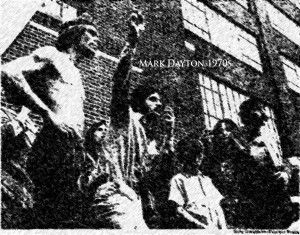Committee Tells Politicians: Stop Waffling
Members Insist They Keep Pro-Right to Work Campaign Promises
 Minnesota Judge Dale Lindman ruled that Gov. Mark Dayton’s Executive Order (EO) calling for the unionization of child care providers is unconstitutional. Judge Lindman, an appointee of Gov. Arne Carlson, said that Gov. Dayton’s EO is “an unconstitutional usurpation of the Legislature’s right to create or amend laws”, which “is a violation of the Separation of Powers principle.”
Minnesota Judge Dale Lindman ruled that Gov. Mark Dayton’s Executive Order (EO) calling for the unionization of child care providers is unconstitutional. Judge Lindman, an appointee of Gov. Arne Carlson, said that Gov. Dayton’s EO is “an unconstitutional usurpation of the Legislature’s right to create or amend laws”, which “is a violation of the Separation of Powers principle.”
The Examiner called it s “stinging defeat for Gov. Dayton, AFSCME and the SEIU.” Judge Lindman said that the BMS doesn’t have statutory authority through Chapter 179 to get involved in this dispute, adding that they only have the authority to mediate in employer-employee disputes.
HotAir.com weighs in on the news:
Dayton attempted to bypass the state legislature in this effort by declaring through executive order that day-care centers that indirectly receive state aid through their clients are in effect public-sector workplaces — a definition not found in law or in legislative intent. In fact, as Gary Gross points out, it arguably contravenes state law. That way, Dayton could order an election that would allow his union allies to force their way into day-care workplaces, including many independent operations, and start extracting dues on a massive basis.
I use the word extreme for a couple of reasons. First, it fits; had Dayton succeeded in his imposition of public-worker status, the precedent established would have been so broad as to threaten the very notion of a private-sector workforce altogether. Where would the limits have been? Fast-food restaurants that take food-stamp debit cards? Medical care facilities that accept Medicaid patients? Just as in ObamaCare at the federal level, it would be difficult if not impossible to find a limitation of power in that kind of precedent.
Second, it was Mark Dayton who used the word extreme to describe the right-to-work referendum currently stalled in the Minnesota legislature. Dayton and his union allies, who very nearly got a big payday from Dayton’s abuse of power, consider it extreme to allow people the choice of whether to join a union while remaining employed, but not extreme to force independent babysitters into unions simply because some of their clients are on state assistance. A poll taken at the time shows the right-to-work referendum to be so extreme that it’s supported by Minnesota voters by more than a 2-1 margin (55/24), and has majority or plurality support among all demographics — even Democrats and self-described liberals.
And yet, the state GOP seems intent on hiding from this issue by bottling up the bill that would put the referendum on the ballot in November. Why?

Members Insist They Keep Pro-Right to Work Campaign Promises

Biden Labor Board claims ATU union did not violate law even after Transdev worker experienced slap and termination attempt from union officials

Facing state prosecution for violating City employee’s rights under 2018 Janus US Supreme Court ruling, IBEW stops dues seizure & issues refund to Chicago 911 operator